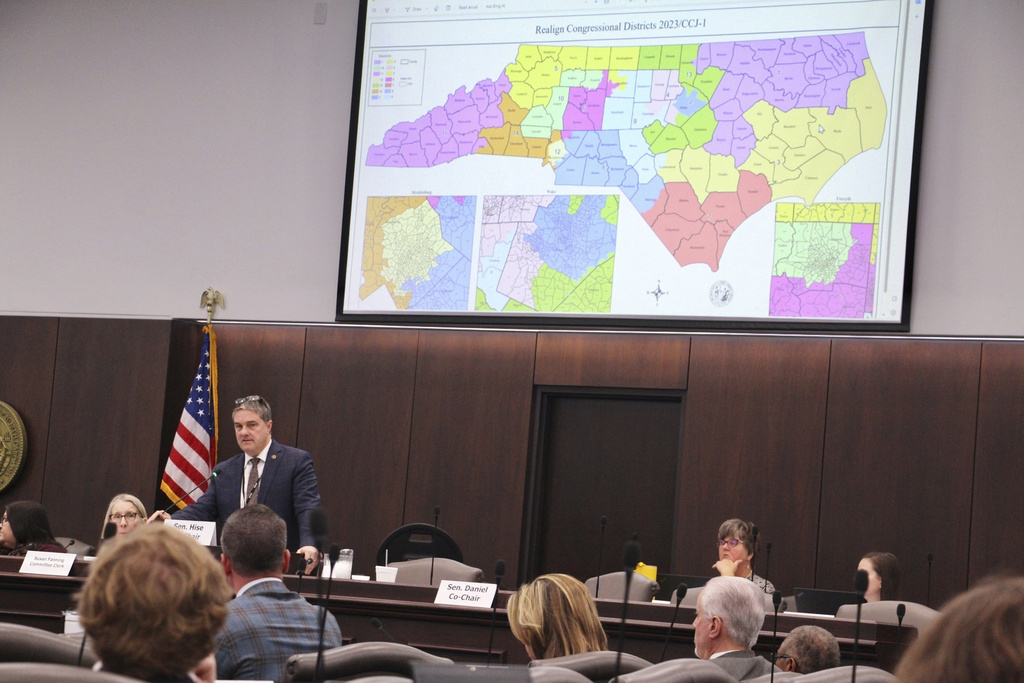

With Super Tuesday approaching next week, several states recently affected by redistricting will witness the first test of the new congressional maps that have effectively ousted some members and set districts up for their first competitive primary fight in years.
Alabama, Wisconsin, New York, and North Carolina are some of the many states that faced court battles over their existing congressional maps, with challengers arguing that they violated the Voting Rights Act and disproportionately represented minority voters.
Now that the courts have ruled in favor of new maps, eyes will be on states like Alabama and North Carolina on Super Tuesday to see how redistricting will affect their delegation numbers, which members will stay in power, and who will serve their last term.
Alabama
Alabama’s delegation was uprooted following the approval of Remedial Plan 3 — instead of six safe GOP districts and one safe Democratic district, Democrats have a strong chance of winning the 2nd Congressional District, represented by Rep. Barry Moore (R-AL).
One of the most watched races will be the one between Moore and Rep. Jerry Carl (R-AL), who are facing off in the state’s 1st District after Moore’s hometown in the 2nd District was shifted into Carl’s district under the new maps to meet the requirement of a second majority-black district. Super Tuesday will end one of the representatives’ careers; both have represented their districts since 2021.
Under the new maps, Carl and Moore are competing in a solid red district that former President Donald Trump would have won by over 50 percentage points in 2020, per Roll Call. Carl has retained support from establishment Republicans and Majority Leader Steve Scalise (R-LA), while Moore has drawn endorsements and donations from House Freedom Caucus members. Trump has not endorsed in the race, but he supported both of them in their 2022 midterm races.
Moore’s shift to battle Carl in the primary ushered in a wave of primary candidates from Democrats and Republicans to make Alabama’s 2nd District the most competitive primary in years. According to local outlet WKRG News 5, several of the 2nd District candidates do not live in the district.
Ten Democrats and seven Republicans are running to take Moore’s seat, and the Cook Political Report rates Moore’s open seat as “likely Democrat.” Before the maps, Moore’s seat was not considered a competitive race.
Redistricting transformed the 2nd District to become 49% black, and given a majority of the Democrats running to replace Moore are black, Alabama could elect two black representatives to the House for the first time in its history. The state’s only black representative is Rep. Terri Sewell (D-AL), who has held her seat since 2011.
Also looming over Alabama’s Super Tuesday is the recent Supreme Court ruling that determined frozen embryos were children. The ruling halted in vitro fertilization programs across the state and created headaches for House Republicans during a critical election where women’s healthcare and abortion will be at the top of voters’ minds and likely affects which party holds the majority next year.
Considering an overwhelming number of GOP voters support IVF and, statistically, many Republicans have used IVF procedures to build families, this creates a stronger urgency for Alabama Republican primary candidates to distance themselves from the ruling and convince voters they will not be taking the option away from them.
North Carolina
North Carolina’s new congressional maps led to a wave of retirements and turned the 1st District into the state’s only swing district. The new redistricting gives Republicans an expected 10- or 11-seat advantage, up from the current 7-7 delegation split.
There will be five open seats after Democratic Reps. Wiley Nickel, Kathy Manning, and Jeff Jackson decided not to run after the new maps redrew their districts more favorably to Republicans. Two of the remaining open seats are held by outgoing Reps. Dan Bishop (R-NC) and Patrick McHenry (R-NC) and are projected to remain red.
Following the Democrats’ and Republicans’ retirement announcements, flocks of primary candidates entered the contests. Fourteen Republicans are competing for Nickel’s seat, six GOP candidates are running to replace Bishop, and five are vying for McHenry’s spot, for example.
In the 1st District, Rep. Don Davis (D-NC) is facing a tough primary, as his seat moved from lean Democratic to a toss-up, R+1, once the maps were finalized in October last year. The district, which has been held by a Democrat since the 1880s, has trended toward Republicans over the last few election cycles, but the new maps push the territory even further into GOP hands. Following the latest redistricting, it pushed the district from President Joe Biden +7 to Biden +2, making Davis one of Democrats most vulnerable incumbents.
Though representing a historically black district, whether Davis, a black Air Force veteran and former state senator, remains in his seat will depend on the winner of the GOP primary: 2022 Republican candidate Sandy Smith, who is back for round two, and retired Army Col. Laurie Buckhout. Smith lost to Davis, 52.4% to 47.6%, last cycle. However, the Cook Political Report projects that Buckhout as the GOP candidate will place Davis in a significantly risky general election.
Eyes will also be on the 6th District after Manning announced in December that she would not be running for reelection following the redistricting. Her district is a solid red district, R+11, where she said she would run for reelection if her federal lawsuit alleging the new map disenfranchises voters is successful.
CLICK HERE TO READ MORE FROM THE WASHINGTON EXAMINER
Six GOP candidates are in the race to replace Manning, including healthcare lobbyist Addison McDowell, who is endorsed by Trump, former 2022 congressional candidates Bo Hines and Christian Castelli, and former Rep. Mark Walker.
Hines had received backing from the former president in 2022 when he won the GOP candidacy for Alabama’s 13th District, but he ultimately lost the race to Nickel by 3 percentage points. Walker served in Congress for six years until 2020, when he retired to launch an unsuccessful race for the GOP Senate nomination in 2022. He decided to forgo a run for governor and return to Washington, D.C., politics after seeing the new congressional maps.






